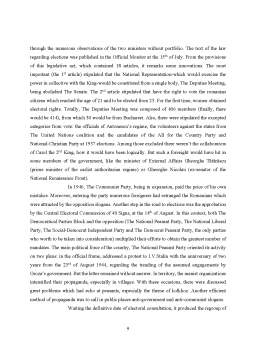Extras din proiect
After the overturning of Antonescu's dictatorship, the course of the country development had suddenly estranged from Europe, orientating to the East. The entrance of Romania under Soviet Union's sphere of influence (1944) and the instauration of the communist regime (1945-1947) is a fundamental problem of national history. These events lead to the abolishment of the existing structures and to the drowning of the intellectual and spiritual affinities with the Occident in a foreign ethos. In political life, an unprecedented authoritarism took the place of a secular experiment of parliamentarian democracy; in economic life, a planification and a rigid centralized leadership replaced the free mixture of particular enterprise and coordination by the state; regarding the thinking and the spirit, the intellectuals were forced to put their talents at the base of creation of "new societies".
The historiography before 1989 presented the events which leaded to the instauration of the communist regime in Romania as being the expression of "progresist popular masses'' desires. But today it is known that the coming of the communists at power was determined by soviet's volition imposed by the presence of The Red Army on the actual territory of our country and by the political forces destruction which militated for the maintenance of democratically political pluralism. The instauration was made through global political and economical means, through peaceful means, when it was not met resistance and through bloody repression, when it was met, but pointed against those which potentially could become their enemies. Also, the secret agreements between the Great Powers decided the future destiny of Romania. At the 9th of October 1944, on a meeting in Moscow, Churchill proposed Stalin and obtained from him the division of South-Eastern and Eastern Europe in spheres of influences: The Soviet Union would obtain a prevailing of 90% in Romania while, as a compensation, The United Kingdom would obtain the same percentage in Greece. In Yugoslavia and Hungary, the two superpowers would have the same preponderance and in Bulgaria The Soviet Union would obtain a prevailing of 75%.
In the projects of organization of the postbelic world, elaborated by Foreign Office and the State Department it was took into consideration that a great superpower like The Soviet Union having, besides this statute, a major contribution in the war against Germany, must benefit of a security belt made up by more or less custom states, with a policy in agreement with The Soviet Union interests. Also, Moscow watched over The Western Allies to undertake nothing without her accord in the zone which considered that belonging to her influence sphere.
Romania signed the armistice with the Great Powers, The United States, Great Britain and The Soviet Union when the romanian-german battlefield had been broken in August 1944. So, it was created an Allied Commission for Control, under soviet presidency, to watch over the state administration and to verify the conditions of armistice fulfilment. Soon, it was proved that the western powers representatives were not consulted as regards the commission activity and their participation was fictive. There are three factors that would influence the future of the country in this period. The first was the continuous economic pressure exercised by soviet military and civilian organs. The second observation refers to the duplicity of the communist party, which, while his representatives were participating at the Council of Ministers proceedings, lead, with the help of his political allies, a campaign for the destruction of political and social structures of the country. The third factor which influenced the events from this period is what the annalists name “The American policy of no policy”. They sustain that The United States refused to make any political agreement on the duration of the military operations on Europe, that The United States remained indifferent of any relative planning of the South-Eastern Europe future. Being directed by the assistant minister of Soviet Union’s External Affairs, Andrei Vîşinski, the communists could boycott the Sǎnǎtescu and Rǎdescu Governments, blaming the democratic parties for instigation to violence.
At the middle of October 1944, the communist party promoted a political coalition named The Democratic National Front. Besides communists, in the front’s composition entered The Social-Democrat Party, Ploughman’s Front, Patriot’s Union, Patriotically Defence and The Magyar Workers Union from Romania. Although these were left organizations, the front’s programme avoided the social revolution ideas. The front was destined to activate on a large scale the democratically and personal organizations which not wanted to return at the interwar social system and policy. The fight for power touched the climax on the 24th of February when a demonstration organized by The Democratic National Front made for The Ministry of Internal Affairs. There were some shots and several persons were killed. Nicolae Rǎdescu, the president of The Government publicly accused Ana Pauker and other communists of the responsibility of this incident and of the attempt of government overturning. The communists and the soviet authorities, in their turn, blamed Rǎdescu government and soviet officials convoked him at The Allied Commission for Control headquarters to explain him in connection with the accusations brought to communist leaderships.
Preview document
Conținut arhivă zip
- 1946 Elections from Romania.doc














